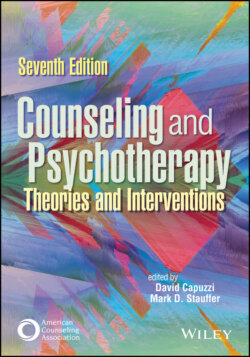Читать книгу Counseling and Psychotherapy - Группа авторов - Страница 76
Cultural and Social Justice Foundations Power and Equality
ОглавлениеEarly in its development, RCT led at the forefront of counseling theories that intentionally centered culture, social justice, neuroscience, and the role of dehumanizing power structures as key theoretical counseling considerations (Jordan & Hartling, 2008). Miller (1986) explored the dynamics of equality and how social, racial, and relational systems favor and serve those in power positions. In exploring these systems of inequality, Miller conceptualized relational power imbalances as temporary or permanent. Temporary power imbalances represent socially defined roles, such as teachers and students or parents and children. The goal in these relationships is to eventually equalize the power differentials and serve the growth of those in subordinate positions. Despite this ideal, Miller contended that people often fail at promoting movement toward true equality in these types of relationships. People struggle with giving up power, especially when the voices and desires of those in subordinate roles differ from those in dominant positions.
Likewise, and potentially even more insidiously, permanent inequality represents ingrained power structures that relegate people to social positions on the basis of race, sex, gender identity, sexual affectations, ethnicity, and other ascribed characteristics of a person (Hammer et al., 2016; Miller, 1976, 1986). Within this social-relational framework, the characteristics and attributes of the dominant group set the expectations that define what is normal and abnormal, and people in subordinate social positions lose their voice, identity, and sense of mattering within the larger group. Oftentimes when people challenge the status quo of inequality, they meet acute and sustained violence, subjugation, or exile. Moreover, institutional, criminal, and economic structures serve to maintain inequalities in society and between people (Miller, 1976, 1986).
Many people in the dominant group avoid upsetting the balance of power because it may serve them well. Discussing and developing awareness of the myriad levels and expressions of inequality and power abuse may feel uncomfortable, and counselors serve their clients best when they are attuned to the ways power is experienced in a client’s context. RCT scholars explored the very dimensions of racism, societal injustice, and disenfranchisement that guide conversations today about multicultural and advocacy work (Comstock et al., 2008; Jordan, 2018; Miller, 1976, 1986). RCT offers a counseling framework for healing and advocacy that places a person’s life in context, and RCT counselors work to use their power with people rather than power over people (Jordan, 2018). Counselors also work to create the kinds of relationships that attend to how power hurts and how they can use their power to support equality and liberation from painful contexts. The work done in RCT is relational, mutual, and keenly focused on power to (Jordan, 1991) bring change in the counseling space.
